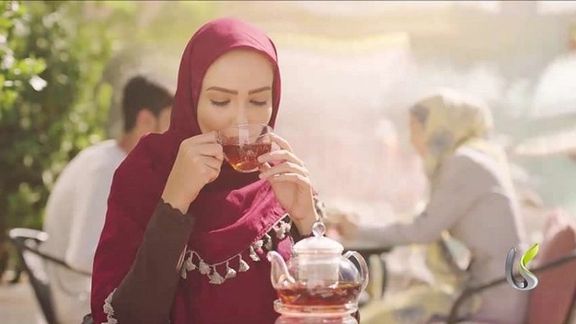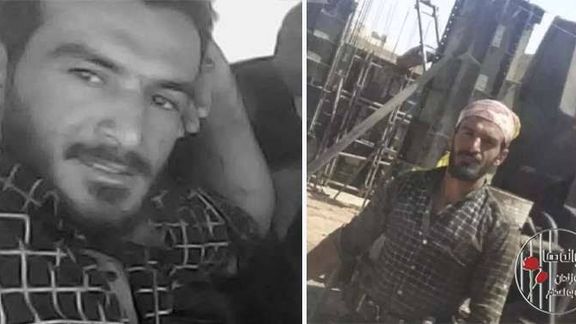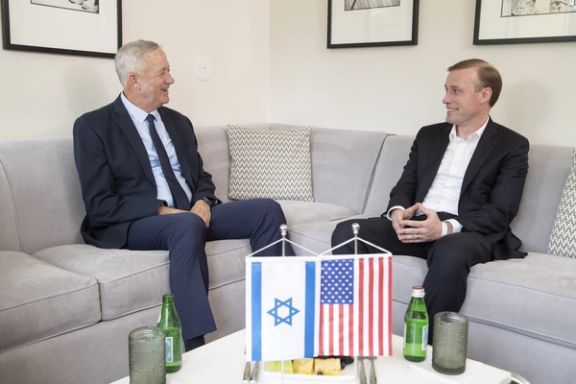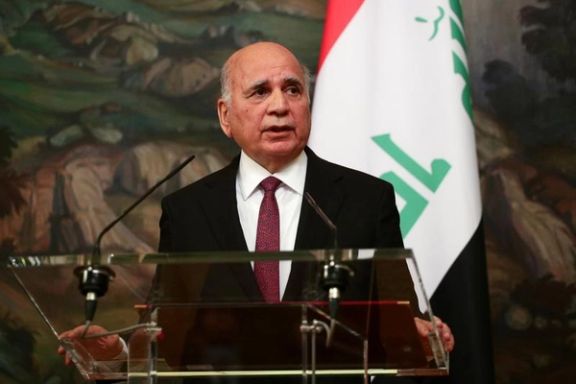Iran Bans Women From Appearing In Advertisements

The Islamic Republic has imposed a ban on any use of female images or actors in all types of Iranian commercials and advertisements, a viral photo of the order shows.

The Islamic Republic has imposed a ban on any use of female images or actors in all types of Iranian commercials and advertisements, a viral photo of the order shows.
The Ministry of Culture and Islamic Guidance announced in a letter to Iran's art and cinema schools that according to the so-called "hijab and chastity rules”, the presence of women in advertisements is prohibited from now on.
According to the letter the ban is in accordance with the rulings by the Supreme Council of the Cultural Revolution, and based on the country’s laws and regulations of commercial advertising, which forbids any "instrumental use" of women, men and children.
The ban has actually always been in place but the interpretation of "instrumental use" varies according to political and religious inclinations of particular presidential administrations.
Tweet unavailable
The recent announcement of the ban comes following a controversial video of an ice-cream ad, which used close-up shots of an Iranian woman biting the chocolate-coated dessert.
The body responsible for “enjoining right and forbidding evil” in the Islamic Republic recently filed a lawsuit against the ice-cream manufacturer Domino over two controversial commercials, which it said were “against public decency” and “insult women’s values.”
The whole controversy is taking place on the backdrop of a heated debate over Iran’s enforcement of Islamic dress code or hijab in public, while many Iranian women, who wear the hijab by choice, have joined new social media campaigns this week against street patrols to force women to follow strict laws.

At least 45 people were executed in Iran during the previous month, and a political prisoner also received a death sentence.
According to a report by the United States-based Human Rights Activists' News Agency (HRANA) on Saturday, the executions were carried out in several prisons across Iran, including Gohardasht Prison – also known as Rajai-Shahr in Karaj, Borujerd, Birjand, Yazd, and Esfahan.
In Rajai-Shahr prison, at least 18 prisoners were executed, 10 in one day before another eight a week earlier.
The report added that a political prisoner in Orumiyeh (Urmia) prison, identified as Shaker Behrouz, was sentenced to death by Branch 1 of the city’s Revolutionary Court and several other prisoners, including a woman, were also sentenced to death on charges of murder.
In addition to the 45, Iran on Saturday carried out its first public execution in over two years in an eye-for-eye move, called ‘qisas’ according to Quranic principles. Iman Sabzikar, who had been convicted over the murder of a police officer in February 2022 in the southern city of Shiraz, was hanged in the early morning at the scene of the crime.
On June 16, UN Secretary General António Guterres released a report on the situation of human rights in Iran, decrying “the high number of death penalty sentences and executions” and “reports of death in prison due to denial of adequate and timely medical care.”
The UN chief said that the number of executions in Iran increased from at least 260 cases in 2020 to 310 individuals in 2021, and the number continued to rise into 2022.

If NATO wins in Ukraine, Iran would be its next target, the hardline Kayhan wrote Sunday, reinforcing Tehran’s support for Russia and calling for "pre-emptive defense."
Kayhan’s strong endorsement of Ali Khamenei’s support for Putin during their meeting in Tehran on July 20, was coupled with an editorial in the Revolutionary Guard Javan newspaper Sunday. Javan spoke of “pre-emptive legitimate defense”, without naming Ukraine, but in the context of defeating the West.
Javan argued that when Muslims are endangered it is legitimate to strike pre-emptively and side even with a “despotic ruler”, although it clarified that Putin is not such a leader.
The Kayhan and Javan editorials signal an attempt to justify Iran siding with Russia in the Ukraine war, by offering military assistance, by raising the far-fetched “pre-emptive legitimate defense” argument when neither Russia nor Ukraine have borders with Iran.
The Kayhan editorial was written by its ultra-hardliner editor Hossein Shariatmadari, who enjoys the title of Khemeni’s representative at the flagship conservative newspaper and is seen as reflecting the views of the Supreme Leader.
Shariatmadari described Khamenei’s praise for Putin’s “initiative” to attack Ukraine as “a serious warning to America and its allies” who “are playing with the lion’s tail.” He also wrote that “Iran is one of the next main targets” of NATO, if the Western alliance wins in Ukraine, which would justify a preemptive reaction.

Khamenei also told Putin in Tehran that if the Russian ruler had not taken the initiative, NATO was preparing to start a war in Ukraine in any case.
When the Russian invasion of Ukraine started in February, Iran tried to exhibit neutrality, calling for an end to hostilities, but blaming the West for triggering the war by expanding NATO.
At the same time the 11-month-long negotiations in Vienna to revive the 2015 nuclear deal, JCPOA, came to a halt less than two weeks after the invasion and Tehran has since refused to accept an offer the West had made in December, insisting on more demands that Washington considers “extraneous” to the nuclear issue.
In mid-July the United States warned that Russia was preparing to acquire military drones from Iran to use in the war. A few days later Putin traveled to Tehran, where Khamenei clearly sided with the Kremlin on the Ukraine issue.
Shariatmadari insisted that the Islamic Republic “considers Russia’s confrontation with America and NATO in Ukraine as part of its own security and logically and naturally will support it.”
Javan argued that Iran “is pursuing legitimate pre-emptive defense” and will spare no efforts in neutralizing “the enemy’s evil plans” and weaken Western “hegemony and the establishment of a new world order.”
The invasion of Ukraine and Russia’s confrontation with the West fits perfectly with Khamenei’s anti-Western ideology that has determined Iran’s foreign policy for more than three decades. The United States is often labeled as “World arrogance” by Khamenei and his supporters who have rejoiced at any sign of Chinese-US or Russian-US tensions.
Khamenei in his speeches has constantly called for a tilt toward the East, as Iran’s best strategic path, praising relations with Moscow and Beijing, although both sided with the West in early 2010s to limit Tehran’s nuclear program.
The pro-Russia foreign policy has been criticized by former politicians and pundits in Tehran, who often cite the Islamic Republic’s original motto of “Neither East nor West.”

Israeli Defense Minister Benny Gantz met with US National Security Advisor Jake Sullivan to discuss deepening bilateral defense cooperation in face of the Iranian threat.
The two held a meeting on the sidelines of the Aspen Security Forum on Friday, where they also discussed President Joe Biden’s visit to Israel and Saudi Arabia and its effects on ways to strengthen regional cooperation.
“We discussed the growing threat posed by Iran to the world, the region and to the State of Israel via its nuclear program and growing aggression via proxies, maritime activities, cyberattacks and more, and ways to create a united front against the region’s biggest destabilizer,” Gantz tweeted.
Gantz also held separate meetings with former US secretary of state Condoleezza Rice, former secretary of defense Mark Esper, and Iowa’s Republican Senator Joni Ernst.
In an interview during the Aspen forum, Gantz noted that war with Iran was the least desired option, saying, “Should we jump to a war at the first opportunity we have? No. Should we be able to conduct military operations to prevent it [a nuclear Iran] if needed, the answer is ‘yes.’ Are we building the ability [for war]? Yes. Should we use it as a last case? Yes – and I hope that we will get US support.”
During Biden’s trip, the Jerusalem US-Israel Strategic Partnership Joint Declaration was issued in which Washington reaffirmed its commitment “never to allow Iran to acquire a nuclear weapon” and promised that “Israel had a right to defend itself by itself.”

Saudi Arabia and Iran have reportedly agreed to hold the first public meeting at the level of foreign ministers in Baghdad following rounds of closed reconciliation meetings.
Iraqi Foreign Minister Fuad Hussein told Erbil-based media network Rudaw on Saturday that Baghdad hosted five rounds of talks between Tehran and Riyadh “between intelligence and security officials,” adding that this upcoming round of negotiations will be public.
He did not elaborate when the meeting will take place, adding that “The Saudi crown prince asked us to host the meeting of the Saudi foreign minister with his Iranian counterpart in Baghdad.”
On July 21, Iran's Foreign Minister Hossein Amir-Abdollahian said Saudi Arabia has shown readiness to advance the bilateral talks from security issues to the political phase. "Last week we received a message from Iraqi foreign minister [Fuad Hussein] saying that the Saudi side is ready to move the talks from a security phase to a political and public one.”
"We also expressed our readiness to continue talks at the political level so that it leads to the return of Iran-Saudi Arabia ties to the normal level," he added.
Late in June, Iraqi Prime Minister Mustafa al-Kadhimi traveled to Iran and met with President Ebrahim Raisi after a visit to Saudi Arabia and meeting with the kingdom’s de facto ruler Crown Prince Mohammed bin Salman aimed at jumpstarting stalled talks between Tehran and Riyadh.
Saudi Arabia cut ties with Iran in 2016 when mobs attacked its embassy in Tehran after Riyadh executed 47 dissidents including the leading Shiite cleric Sheikh Nimr al-Nimr.

Iranian president Ebrahim Raisi has tried to defend his dismal economic performance by blaming his predecessor, but that tactic seems to have run its course.
Former President Hassan Rouhani and his aides are increasingly challenging Raisi’s claims that he inherited an empty treasury with no foreign currency reserves and a mountain of unpaid bills.
In a speech to former government officials and aides in his office in Tehran July 18, Rouhani claimed that there were billions of US dollars in cash in the Central Bank of Iran when his is administration handed over the treasury to the new administration in August last year.
It should be noted that Iran had already increased its oil exports from the end of 2020, after the incoming Biden administration signaled its intention to return to the 2015 nuclear agreement, the JCPOA, which would mean lifting sanctions imposed by President Donald Trump in 2018. Therefore, the Rouhani administration had about 8 months of higher oil sales when it handed over the treasury.
Economy minister Ehsan Khandouzi finally admitted to reporters on July 20 that the country had a “good cash reserve” of foreign currency when the current administration took over but also claimed that the cash reserves were earmarked for “paying for services” and could not be used for importing goods and “solving the country’s’ trade problems”.
The economy minister’s admission contradicted claims by various government officials during the past year that the Rouhani administration had handed over an empty treasury.
Two months before handing over the government, former vice president Es’haq Jahangiri, had told reporters that the incoming administration would be in possession of the “most unprecedented foreign currency and gold reserves”.
Officials of the Raisi administration claim that his government has not resorted to printing money and has even succeed in reducing the monetary base by 0.5 percent in the three-month period ending June 21 in comparison with the same period the previous year.
Monetary base (MO) is the total amount of a currency that is either in general circulation in the hands of the public or in the form of commercial bank deposits held in the central bank's reserves.
In a tweet Thursday, the former governor of the Central Bank of Iran (CBI), Abdolnaser Hemmati, responded that the Raisi administration’s repeated assertions of not having borrowed money from the CBI to offset its budget deficit were not true as the administration had withdrawn from the accounts of government-owned companies to make payments.
“Tweaking statistics doesn't solve problems and [their effects] come to light within a few months. The outcome of the government’s financial and monetary policies should reveal itself in people’s lives,” he wrote.
In the same speech Rouhani claimed that his administration could have removed US sanctions in 2021 had the hardline parliament not passed the ‘Strategic Action to Eliminate Sanctions and Defend Iranian Nation's Interests’ bill on December 1, 2020, which prevented his government from concluding an agreement with world powers to restore the 2015 nuclear deal known as the Joint Comprehensive Plan of Action (JCPOA).
The Raisi administration has so far failed to restore the deal and lift the US sanctions which considerably affect the country’s crude oil exports and squeeze the government for foreign currency. US Secretary of State Antony Blinken recently said the Biden administration would keep using its authorities to target Iran's exports of energy products.